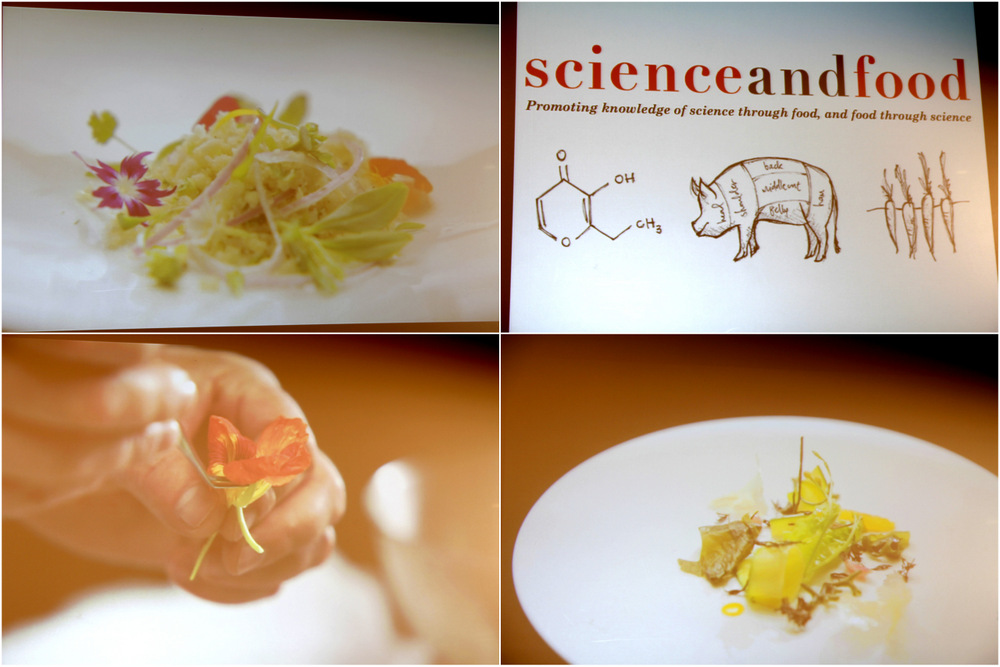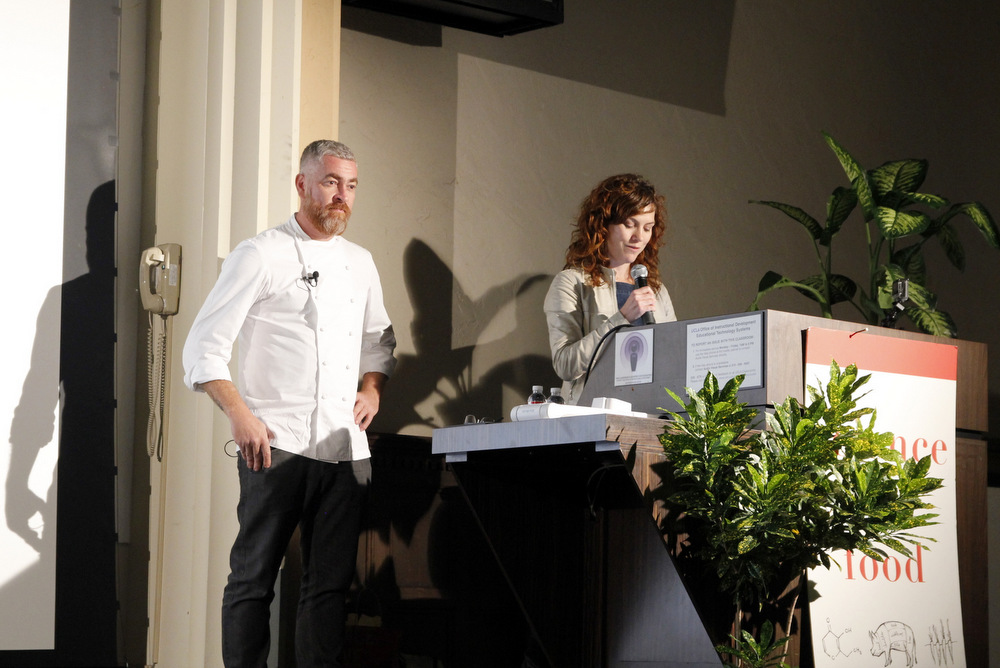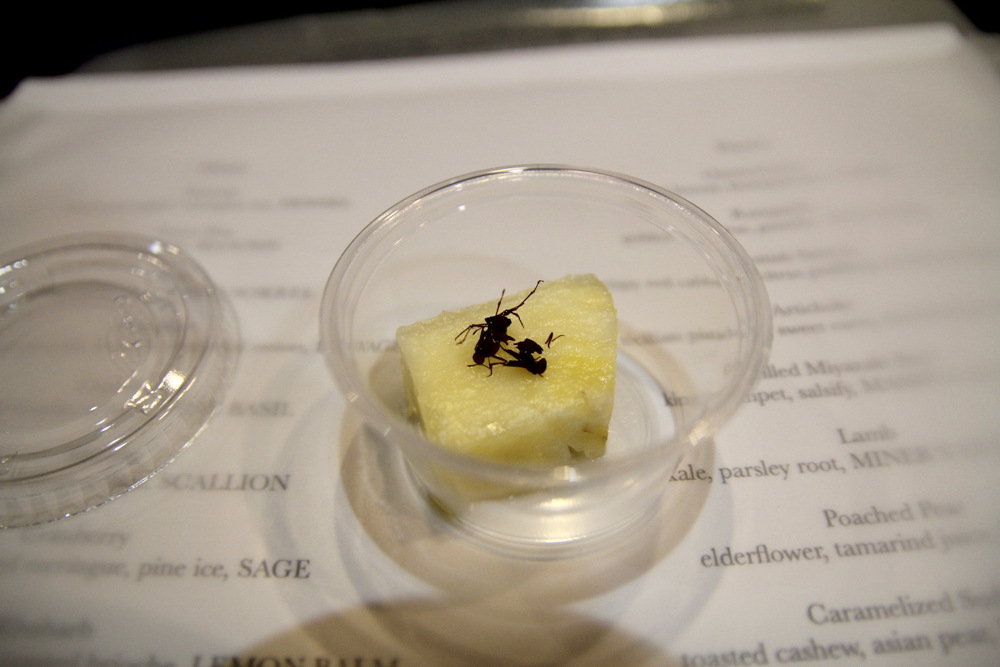/cdn.vox-cdn.com/uploads/chorus_image/image/38967104/_MG_0467.0.JPG)
Last night at a public lecture sponsored by UCLA's Life Sciences program, Brazilian chef Alex Atala spoke with gentle authority about the approach he has taken at D.O.M., currently the 4th best restaurant ranked in the world in San Pelligrino's annual list.
The subject of the evening was the cross-section of the primitive with the modern, and how his exploration into the undiscovered flora of the Amazon compelled him to re-imagine the traditional and regional flavors of Brazilian cuisine in the context of progressive fine dining.
Proclaimed by David Chang as the man "more interesting than Dos Equis' most interesting man in the world," Atala appeared in crisp chef whites and discussed everything from the source of creativity to food sustainability in the developed world.
Alex Atala introduced by Science & Food Director Amy Rowat [Photo: Matthew Kang/Eater]
With slow, concise phrasing, and attempting to be as precise as possible in his non-native English, Atala gets philosophical about how he started upon his current approach: "This is not a typical chef's lesson. I decided to put myself in a trap, to find a different way to understand things. Animals are trained, they're conditioned to do things. They are not intelligent. How many times do we [as humans] act by conditioning, instead of innovation?"
Atala on a chef's creativity: "For me as a chef, creativity is very important. It's not necessarily trying to do something that hasn't been done, but rather doing something in a very unexpected way. It's impossible to make something completely new, but it's possible to make something unexpected. This was the first way for me to escape the trap."
Atala on innovation: "Innovation is creativity that's coupled with utility. Think of Batman. Even fifty years ago, when the comic was written, he had a magic belt, and a 'cell phone' device. When I was younger, in the 1980's, I remember marveling at the fax machine and its ability to transport documents. Now look at today: everyone has a cell phone and no one has a fax machine. Even if the idea of something is older, there was more utility in the cell phone. Innovation isn't just moving forward, it's about having a better understanding of what we've experienced before."
On cultural interpretations of flavor: "What happens when humans domesticate a natural phenomenon? Putting meat over fire produces the Maillard reaction. Now take a mental trip to Nepal, imagine the smell of burning meat. It probably smells good until you realize it's the smell of burning human flesh, as might be traditional there. Or think of my two sons, who love to play soccer, and come home to take off their shoes. Their smell of their socks smells exactly like the cheese in my restaurant."
On insect consumption: "Insects are disgusting. They taste like shit. Can you imagine eating shit from a cow? What about vomit? Have you had honey? You just ate the vomit of a honeybee. Our culture is blind."
[Photo: Matthew Kang/Eater]
And then the ants come get served atop a slice of pineapple: "One time a native woman in the Amazon gave me dried ants. I tasted them and...(waiting for the audience to react to the flavor) it tasted strongly of lemongrass, ginger, and cardamom. These ingredients don't exist in the Amazon. When I brought lemongrass, ginger, and cardamom for this woman to taste, she said it tasted like ants. It's all cultural interpretation."
Building off those examples of flavors in context, Atala then goes into why he's committed to the vegetarian menu at D.O.M.: "I don't care [for] vegetarians. I care about flavor. And the best flavors in my country come from vegetables. I was pushing myself to put fish and meat on the menu. Why? I decided to make something for my customers to play with flavors. "

[Photo: Matthew Kang/Eater]
On what makes a dish with great flavor, Atala talks about the use of traditional ingredients formerly unseen in fine dining in Brazil: "In the Amazon, the natives use manioc [or yuca] flour, so I made a dish with manioc flour, local herbs, chili, and a few drops of charcoal oil, for something bitter. I want the flavors to fight in my mouth, to see which ingredient is the best."
Atala on how to re-conceptual local and traditional ingredients: "I talked to a local producer about using black rice, which has a chewy, gummy texture and was was previously considered diseased. Now this farmer and his cooperative are very successful. I've also made fettuccine using heart of palm, and béarnaise sauce with yerba mate instead of tarragon."
On the biggest challenge for chefs: "Being simple. It's very difficult, and so complex. One dish with three ingredients is a huge challenge for a chef. Sometimes I take out one ingredient and then the dish has clear message."
On his mise en place: "As a chef, I realize that the most important thing is to be organized, with good prep, or mise en place. My prep doesn't start in the kitchen, it starts with natural conservation, from ingredients I get in the Amazon."
In light of the Amazon's continual destruction, Atala on food sustainability: "We must be vigilant about the human relationship with food. There are some things that are not sustainable, and this is scary. "
[Photo: Matthew Kang/Eater]
·All Alex Atala Coverage on Eater [-E-]
·All Science and Food Coverage on Eater [-E-]


